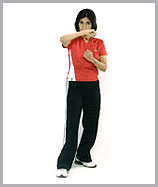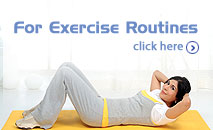
Experience the thrill of boxing without the risk of injury. Rated by Muscle and fitness as one of the “top 10 workouts ever”, this high-energy exercise form attracts scores of fitness enthusiasts.
Kick boxing won’t turn you into a savvy street fighter, but it will definitely improve your fitness levels and help you burn calories while having a great time and you never know you might just get a kick out of it.Always check your posture to ensure that you sit, stand and walk correctly.
 Combine the ‘kata’ of karate with the kicking techniques of taekwondo, add the punching movements and swift footwork used in boxing and then mix all these moves to music. And what have you got? Cardio kickboxing.
Combine the ‘kata’ of karate with the kicking techniques of taekwondo, add the punching movements and swift footwork used in boxing and then mix all these moves to music. And what have you got? Cardio kickboxing.
 Unlike a traditional martial arts routine, this workout combines some elements of martial arts along with cardiovascular exercise making it a high-intensity workout. As the routine picks up speed, the heart rate rises and the workout becomes aerobic.
Unlike a traditional martial arts routine, this workout combines some elements of martial arts along with cardiovascular exercise making it a high-intensity workout. As the routine picks up speed, the heart rate rises and the workout becomes aerobic.
This high-energy workout provides a combination of flexibility, strength, endurance and cardiovascular stamina with the added benefit of learning self-defense skills.
This workout combines fitness, fun and mental stimulation. A typical class comprises of a variety of punches, kicks, knee strikes and other self defense moves interspersed with a base bouncing move. This exercise form can be done with or without a partner. The advantage of a partner workout is that challenge, motivation and co-ordination aspects are increased.
- Techniques are challenging and fun.
- You can play music to add to your stimulation and motivation.
- It is an intense workout that involves focus.
 There are two types of cardio kick-boxing methods, contact and non-contact.
There are two types of cardio kick-boxing methods, contact and non-contact.
Contact:-This method has the participants wearing hand wraps or weighted gloves. Equipment such as - punching bag, boxing gloves, speed bags, kicking shields and punch mitts can be used. Partner drills add variety and fun to the routine and can be used to improve specific skills such as agility and strength. This workout needs great co-ordination and power to keep up with the fast changing drills and routines.
Non Contact:- This method involves shadow boxing moves and training techniques such as circuit stations, karate step, or incorporating the principles of kickboxing into your cardiovascular routine.
- Don’t lock your joints when throwing punches or kicking in a martial arts inspired workout. There is a significant chance of injury if you compromise on technique.
- Cross train with other forms of exercise, such as cycling, walking, strength training and stretching to improve skills and compliment the cardio kickboxing program.
Good quality shoes are a must for this kind of exercise routine, especially when kicking the bags or doing cardio drills and aerobic moves.
- Insufficient warm-up and stretching
- Incorrect form
- Overextending kicks and punches
- Too many high impact moves
- Holding dumbbells when throwing punches
Frequently asked questions
Yes. Unlike boxing, where a boxer or kick boxers goal is to win a fight regardless of injury or impact; cardio kickboxing is not about beating the opponent or winning a competition. It is simply taking advantage of conditioning techniques used in martial arts for a safe and effective workout.
Yes, even though this is an intense workout, you can gradually start with basic moves and progress as you build fitness levels. If you are just starting, lower your kick height and learn the technique of punches and kicks so you do not injure yourself.
Kickboxing is a complete body workout. The kicks toughen the lower body and the punches work the upper body. The core (the abdominals and back muscles) is the centre of action, these muscles are used to stabilize the body for all kickboxing moves.
You could expend an average of 10-12 calories per minute for a 55-60 kg person. A high-intensity cardio kickboxing routine can burn from anywhere up to 500 to 700-calories an hour. Take a look at some of the comparisons listed based on one hour of activity.
- Walking 300 calories
- Circuit weight training 400 calories
- Cycling (nine mph) 400 calories
- Aerobic dancing 400 calories
- Cardio kickboxing 500 - 700 calories
Yes. This is an integrated program that is designed to train mind as well as body. Focus is required on where and how to kick a leg and throw a punch. Learning new moves, correct technique and combinations requires concentration and skill.
To throw a punch with maximum power, it is important to understand that the punch does not originate at the fist or the arm. Instead, it is a chain of movement that begins at the legs going upto the trunk of the body, then to the shoulder, and on to the arm and fist. Each punch involves sequential movement of body segments resulting in high-intensity, high-powered punches.
Wraps are long, narrow pieces of cloth that look like bandages, but are made of heavier, less elastic material. They are used to protect and support the bones of the hands and wrist when punching a bag or focus mitts or pads.
Boxing gloves or weighted fingerless gloves add weight to the end of the arm, providing some resistance when punching. Master proper technique before adding resistance with these type of gloves.
All movements originate from the ready stance or the boxer’s stance. The feet are slightly apart, you can stance with one foot facing forward, or both to the side. The arms are held close to the body with fists covering the head and the heart.
One of the key advantages is that you get the benefits of a cardiovascular workout in addition to the strength and flexibility improvements as a result of kicks and punches.
- Burns fat
- Builds muscle
- Improves aerobic stamina, strength and flexibility
- Improves balance and coordination
- A great stress buster
Generally a typical kickboxing format comprises of:
- Warm-up
- Workout
- Conditioning and strengthening
- Cool-down and stretching
Jab: works the shoulder, chest and arms
From the ready stance, extend one arm and punch forward with your fist, then quickly bring the arm back to start position.
Hook: works the shoulder, chest and waist
From the ready stance, lift one arm to the side and bend your elbow, pivot and punch with your fist, bring the arm back close to your waist. The elbow remains bent throughout execution of the hook.
Uppercut: works the shoulder, back and waist
From the ready stance, take one leg back, bend the elbow of the punch arm, quickly take the arm backward and then forward punching in front with your fist, palm facing up. Your torso rotates slightly during this movement. Then quickly take the arm back again.
Front snap: works front and back of the thighs and glutes/hips
From the ready stance, bend at the hip and knee; extend the knee in a thrusting motion and then return to start position.
Sidekick: works the outer thigh, and back of the thighs and glutes/hips
From the ready stance, abduct (lift laterally) the hip while it flexes slightly with knee bent, then extend the knee in a thrusting motion and return to start position.
Back kick: works the back of the thighs and glutes/hips
From the ready stance, bend at the hip and knee; extend the leg backwards in a thrusting motion and then return to start position.
Roundhouse: works the outer thigh, and back of the thighs and glutes/hips
From the ready stance, abduct (lift laterally) the hip while it flexes slightly with knee bent, then quickly extend the knee forward pivoting in a circular motion. Unlike the side kick which attacks the target sideways, the roundhouse is a frontal assault with the forefoot.
Bob and weave
One partner jabs at shoulder height, while the other bobs and weaves back and forth underneath the punches. Partners then switch places.
Attack and retreat
One partner hops forward and jabs four times quickly, while the other retreats backward four hops. Partners then switch.
- Benefits of Exercise
- Exercise and the Heart
- Exercise and the Bones
- Exercise and Hypertension
- Exercise Excuses and how to beat them
- Over Exercising is bad for you
- Kids gotta Exercise too!
- What is Obesity
- Fitness Triangle
- Running, Skipping and Cycling
- Walking
- Swimming
- Common Fitness Myths
- Evaluate your Fitness Quotient
- Wellness Tools and Charts



